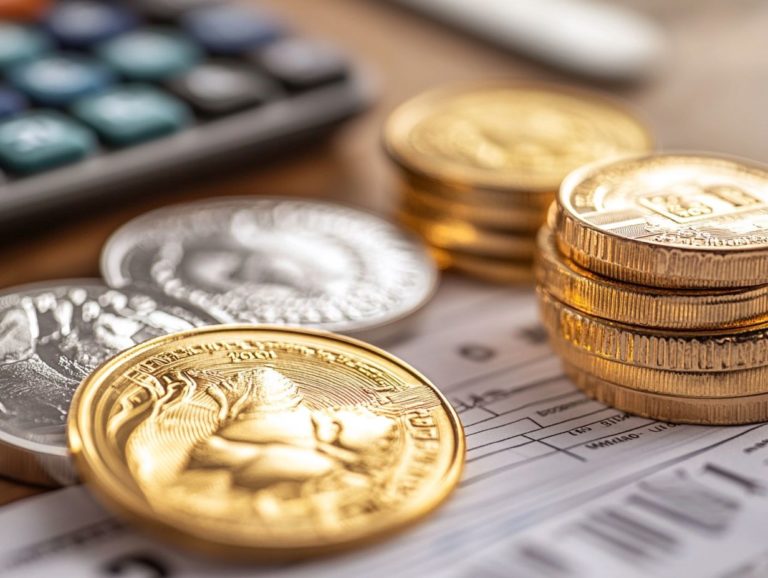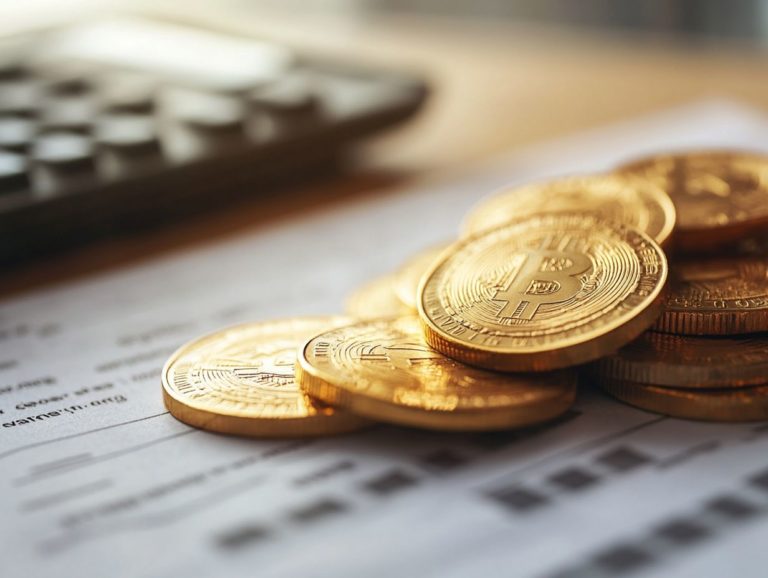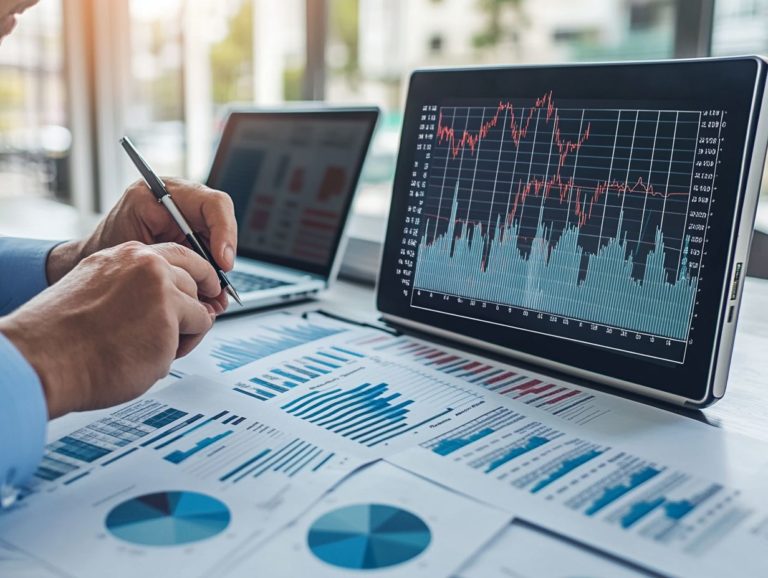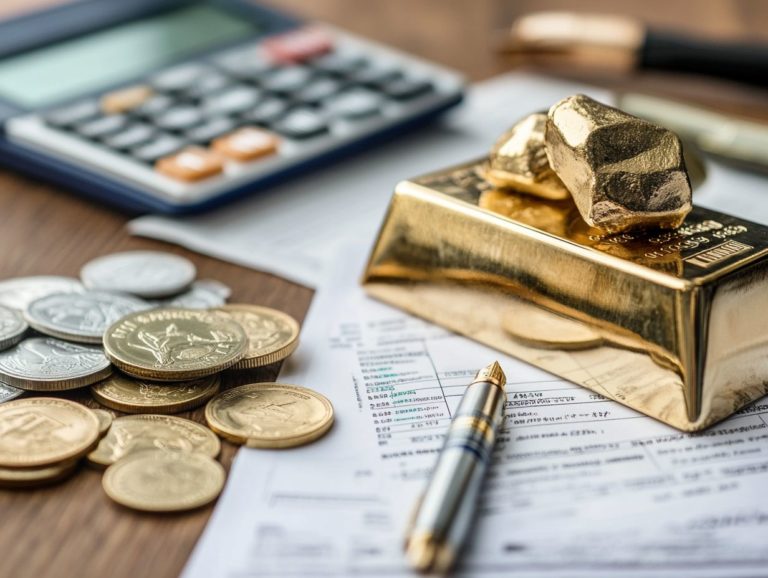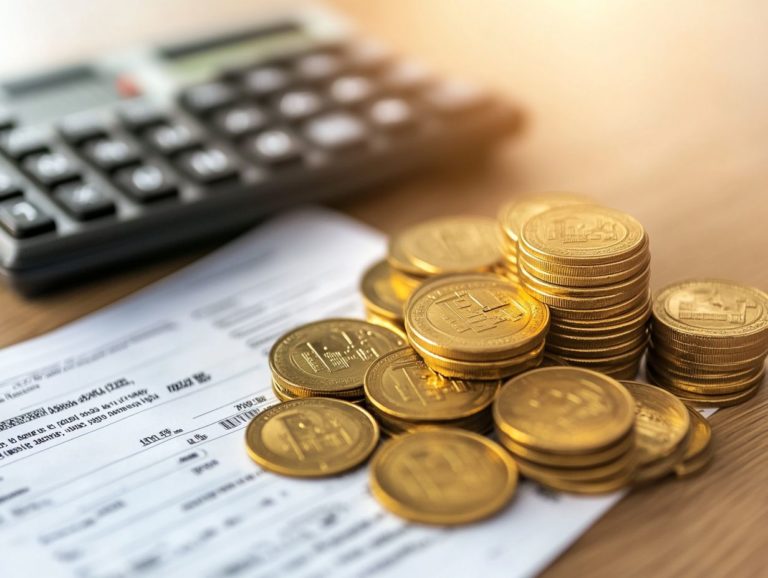How to Simplify Your Tax Process for Precious Metals
Navigating the tax landscape for precious metals might seem overwhelming, but it doesn t have to be. This article provides a clear breakdown of the essential components, starting with an overview of the relevant tax laws and regulations.
You ll discover how to determine your tax obligations based on various factors. Additionally, you will gain practical strategies to simplify your tax process, including effective record-keeping and maximizing your deductions.
The article highlights the benefits of working with a tax professional and provides valuable resources to keep you informed.
Whether you’re a seasoned investor or just starting your journey, understanding these elements will empower you to manage your precious metals investments more effectively.
Contents
- Key Takeaways:
- Mastering the Tax Process for Precious Metals
- Determining Your Tax Obligations
- Methods for Simplifying the Tax Process
- Working with a Tax Professional
- Resources for Staying Up-to-Date on Tax Laws
- Frequently Asked Questions
- Can I use tax software to simplify my tax process for precious metals?
- Do I need to report all of my precious metal investments on my tax return?
- What documents do I need to simplify my tax process for precious metals?
- Are there any tax deductions or credits for investing in precious metals?
- How do I calculate the taxes on my precious metal investments?
- Can I deduct losses from my precious metal investments on my tax return?
Key Takeaways:
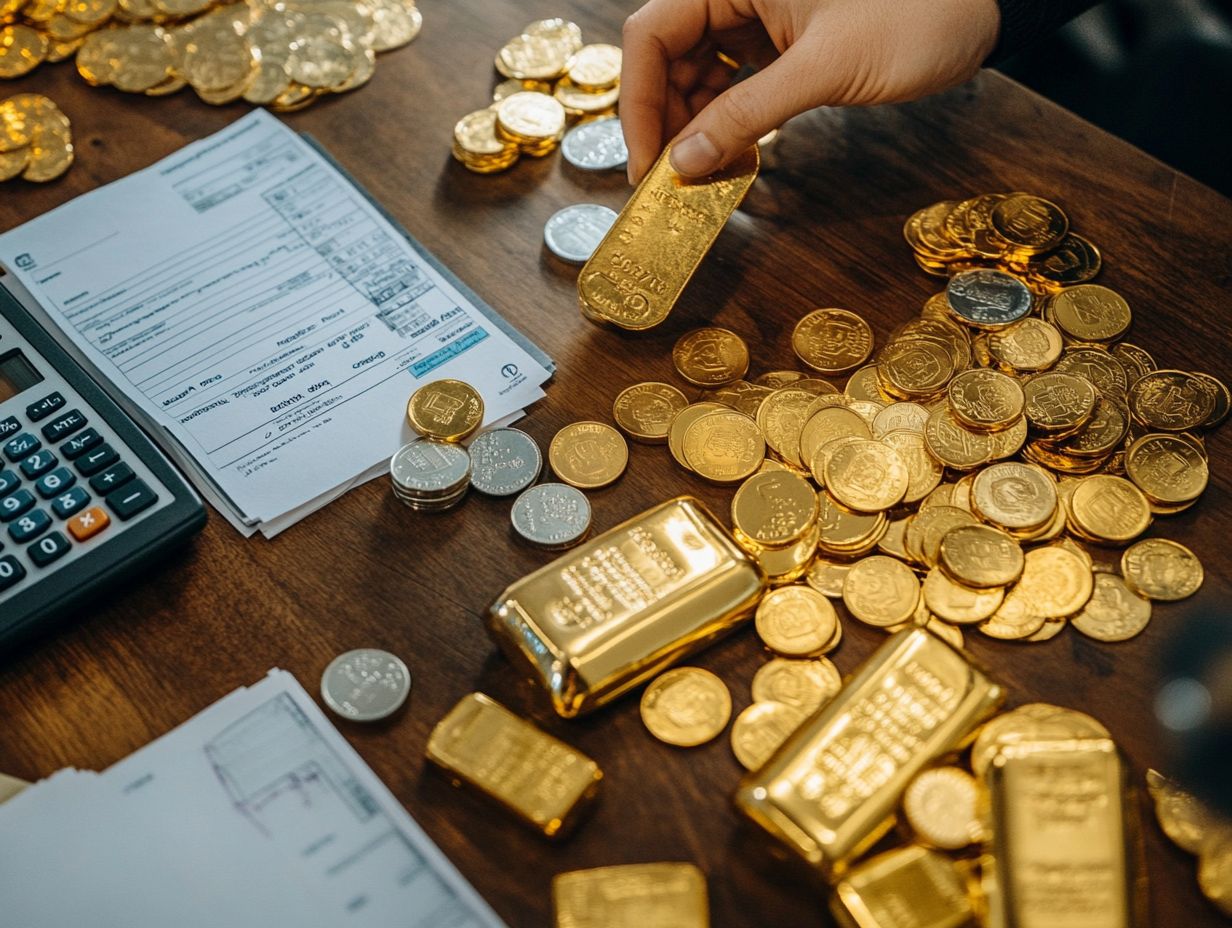
- Keep thorough and organized records of all precious metal transactions to simplify tax reporting.
- Utilize deductions and credits to lower your tax obligations on precious metals.
- Consider working with a tax professional to ensure accuracy and compliance with tax laws for precious metals.
Mastering the Tax Process for Precious Metals
Understanding the tax process for precious metals such as gold, silver, platinum, and palladium is essential for you as an investor. It s vital to comply with IRS regulations, the rules set by the Internal Revenue Service, while navigating the intricacies of profit from selling an asset and tax obligations.
This journey involves several components. These include reporting requirements, tax calculations, and potential penalties for misreporting.
It s crucial to understand how investment vehicles for precious metals can influence your overall portfolio diversification and financial strategy. This consideration becomes even more important when you factor in the audit process and market volatility that could affect your investment returns. By grasping these elements, you can make informed decisions that enhance your financial well-being.
Overview of Tax Laws and Regulations
An overview of the tax laws and regulations governing precious metals reveals the specific reporting requirements you must adhere to, especially when investing in gold coins, bullion bars, and numismatic coins for the IRS.
Understanding these regulations is essential for anyone buying or selling precious metals, as each investment type carries its own unique tax implications. The IRS categorizes these assets as capital assets, which means you need meticulous record-keeping to ensure accurate reporting.
You should be aware of various requirements, such as filing Form 1099-B for certain transactions and declaring gains or losses on your annual tax filings.
Failing to comply can lead to substantial penalties, emphasizing the importance of staying updated on any changes to these laws. Ensuring that all your investment activities align with IRS mandates is essential to avoiding unnecessary tax liabilities.
Determining Your Tax Obligations
Determining your tax obligations regarding precious metals requires careful calculation of capital gains. You need to understand how to accurately assess your cost basis, selling price, and purchase price to evaluate any gain or loss for tax purposes.
This thorough understanding ensures you navigate the complexities of taxation with confidence and precision.
Key Factors That Affect Your Precious Metals Taxes
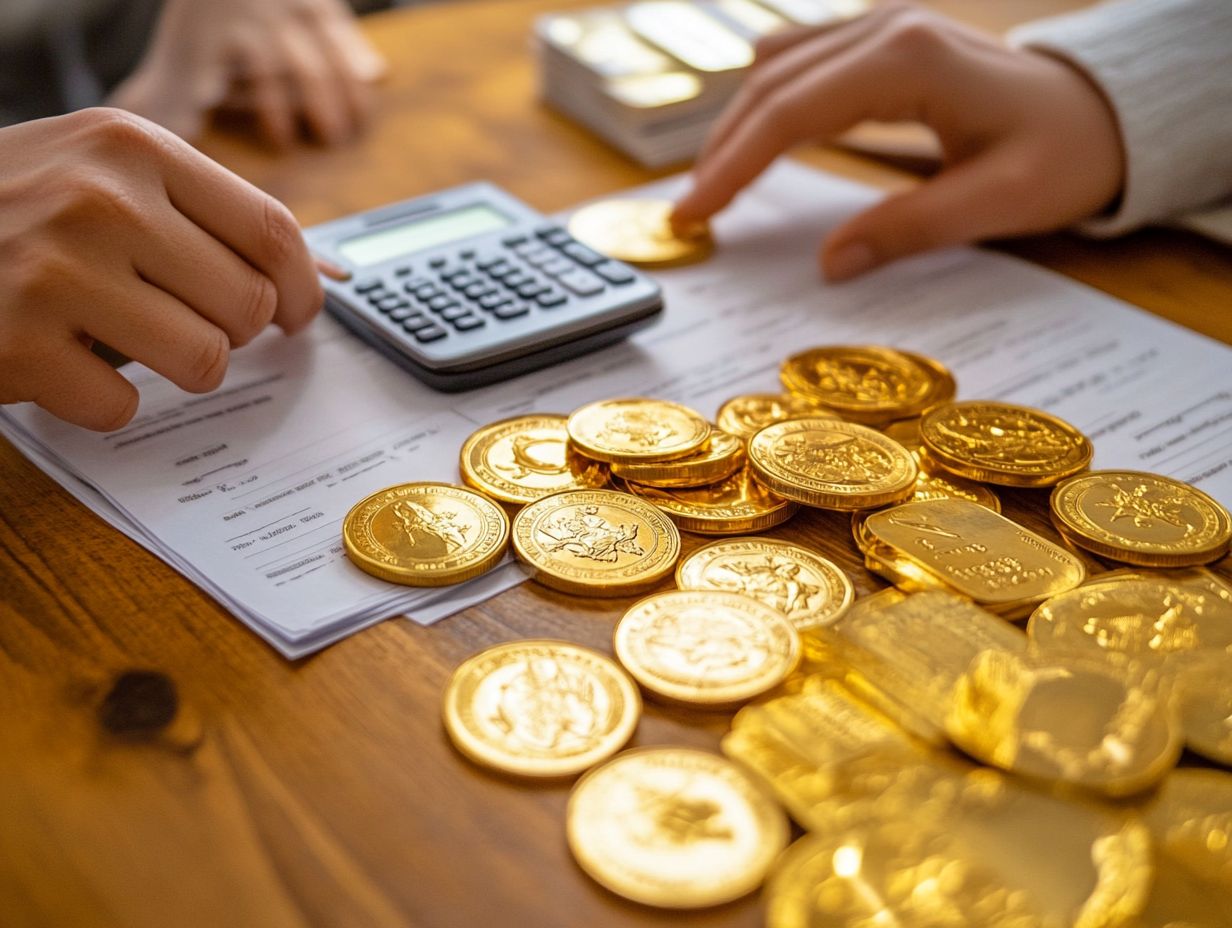
Several factors can influence your taxes on precious metals, including transaction fees, foreign investments, and your income level. All of these play a crucial role in determining your overall tax liability and exposure to investment risks.
Understanding how these elements interact is essential for you as an investor looking to navigate the complexities of taxation in this sector. For instance, transaction fees can chip away at your effective profit from a sale but may be deductible under certain conditions.
Foreign investments can subject you to different tax codes and reporting requirements, making thorough due diligence imperative. Your income level can significantly impact the tax rate on your gains; if you find yourself in a higher income bracket, you could face more stringent tax burdens, complicating your overall investment strategy.
By staying informed and strategizing effectively, you can mitigate potential tax liabilities and enhance your investment experience.
Methods for Simplifying the Tax Process
To simplify the tax process for your precious metals investments, consider implementing effective record-keeping strategies and maximizing deductions. These methods can significantly reduce the burden of tax calculations and reporting requirements, making the entire process more manageable for you.
Record-Keeping Strategies
Implementing effective record-keeping strategies is essential for you as a precious metals investor. This ensures compliance with IRS regulations and facilitates accurate tax reporting.
By maintaining organized and detailed documentation of all your transactions everything from purchases to sales you can create a comprehensive ledger that tracks both the cost basis and market value of your assets. This meticulous process aids in calculating profit or loss from selling and serves as vital evidence in the event of an audit.
Utilizing digital tools, like specialized software or mobile apps designed for transaction tracking, can significantly streamline this task. Cross-referencing your records with brokerage statements and invoices ensures accuracy.
Ultimately, robust record-keeping alleviates stress during tax season and enables you to make informed decisions about your portfolio.
Maximize Your Deductions and Credits
Boost your tax savings by maximizing deductions and credits! This helps minimize your overall tax liability while steering clear of potential penalties from misreporting.
Use various strategies to boost your financial position and take full advantage of tax benefits available to you. It s essential to grasp the specific deductions related to buying, holding, and selling precious metals, along with any applicable tax credits.
For example, maintaining meticulous records of your purchases and sales not only facilitates accurate reporting but also provides a strong defense in case any discrepancies arise with the IRS.
Consulting with a tax professional who specializes in precious metals can uncover additional savings opportunities and guide you through the complexities of financial reporting. For investors, understanding tax brackets for precious metals investors is crucial, ultimately minimizing the risks associated with tax compliance.
Working with a Tax Professional
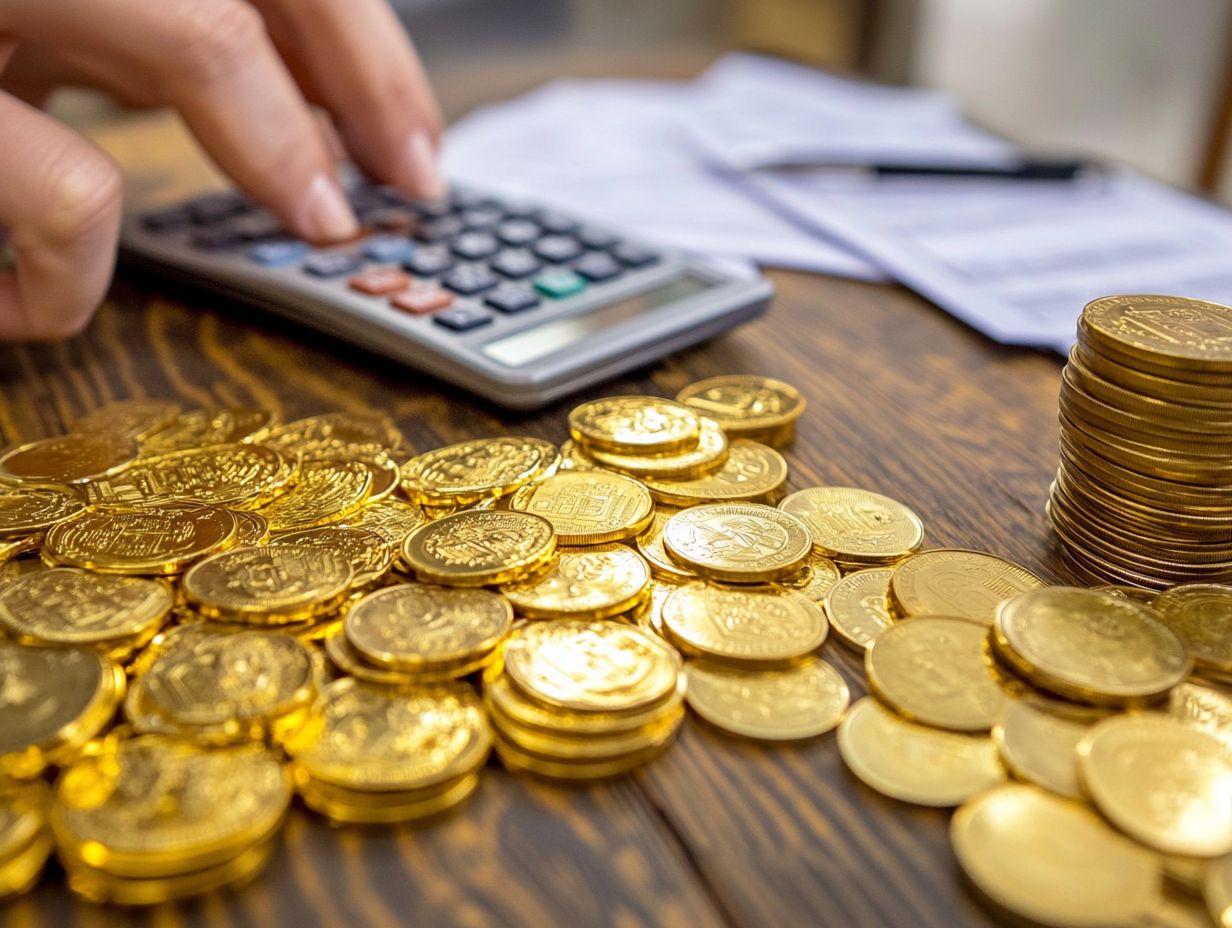
Engaging a tax professional can provide you with invaluable advantages as a precious metals investor. Their expertise is crucial for navigating the intricate tax implications associated with your investments.
They ensure that you make informed decisions that optimize your investment performance.
Ready to simplify your tax process? Start organizing your records today!
Benefits and Considerations
Hiring a tax professional for your precious metals investments offers many advantages. These include personalized tax planning, compliance assurance, and expert guidance on investment strategies that align with your financial goals.
Navigating the intricate world of tax regulations can be daunting. Working with an expert ensures that every transaction is reported accurately, keeping you clear of potential penalties. A tax professional helps you stay compliant and provides valuable insights into the best times to buy or sell assets, taking into account current market conditions and tax implications.
As you consider your investment horizon and spreading your investments across different types of assets, keep in mind that these factors can significantly impact your tax liabilities. Working with an experienced advisor allows you to enhance your overall financial decision-making, integrating tax efficiency into your broader investment strategies. This approach ultimately maximizes your returns while minimizing risk.
Resources for Staying Up-to-Date on Tax Laws
Staying informed about the latest tax laws pertaining to precious metals is essential for you as an investor. A wealth of resources ranging from authoritative websites to insightful publications and comprehensive tax guidelines exists to arm you with the vital information needed to navigate this intricate landscape effectively.
Websites, Publications, and Other Sources
Key resources include:
- IRS announcements
- Reputable financial news outlets
- Industry-specific publications like the Gold Newsletter
These resources enable you to navigate the complex tax implications that come with buying, selling, and holding valuable assets like gold and silver. Notable sites such as IRS.gov provide official guidance on taxation, while financial news outlets, including Bloomberg and CNBC, regularly update their audiences on legislative changes and market trends, ensuring you remain compliant.
By leveraging these invaluable tools, you can better prepare for tax season and sidestep potential pitfalls in your precious metals investments.
Frequently Asked Questions

Can I use tax software to simplify my tax process for precious metals?
Yes, tax software programs specifically designed for reporting and calculating taxes on precious metals can help you accurately track your investments and file your taxes easily.
Do I need to report all of my precious metal investments on my tax return?
Yes, any gains or losses from your precious metal investments need to be reported on your tax return. It is important to keep track of all your investments and accurately report them to avoid penalties or audits.
What documents do I need to simplify my tax process for precious metals?
You will need documentation that shows the purchase and sale of your precious metals, such as receipts, invoices, and brokerage statements. It is important to keep these documents organized and easily accessible for tax purposes.
Are there any tax deductions or credits for investing in precious metals?
No, there are no specific tax deductions or credits for investing in precious metals. However, you may be able to deduct certain expenses related to your investments, such as storage fees or brokerage fees.
How do I calculate the taxes on my precious metal investments?
The taxes on your precious metal investments are calculated based on the gains or losses from the sale of the metals. You will need to determine your cost basis (the amount you paid for the metals) and subtract it from the sale price to determine your gain or loss.
Can I deduct losses from my precious metal investments on my tax return?
Yes, you can deduct losses from your precious metal investments on your tax return. However, there are certain limitations and requirements that must be met, so it is important to consult a tax professional for guidance.










